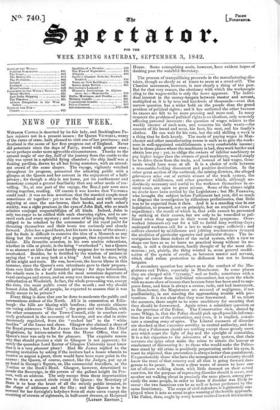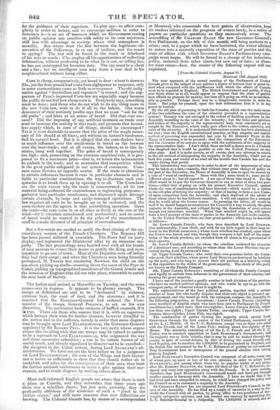The process of tranquillizing proceeds in the manufacturing-dis- tricts, though
so slowly as at times to seem at a stand-still. The
Chartist movement, however, is now clearly a thing of the past. But for that very reason, the obstinacy with which the workpeople cling to the wages-strike is only the more apparent. The indivi- dual interest in the money-bargain between master and servant, multiplied as it is by tens and hundreds of thousands—even that narrow question has a wider hold on the people than the grand problem of political rights; and it has outlasted the other because its causes are felt to be more pressing and more real. In many respects the problem of political rights is an idealism, only remotely affecting personal interests : the question of wages relates to the weekly income of each man, and concerns his daily wants—the amount of his bread and meat, his beer, his rent, and his family's clothes. He can wait for his vote, but the odd shilling a week is a thing that he feels keenly. The mode of paying wages in Man- chester and other manufacturing-towns is such as to give the work- men in well-appointed establishments a very comfortable income ; but in those places where the machinery is bad, they work harder and. obtain less pay : yet, to oblige the owners of inferior machinery to pay higher wages than the owners of good machinery, would simply be to drive them from the trade, and instead of bad wages, thou- sands would have none at all. It is a choice of evils between a reasonable-looking discontent and positive destitution. In the other great section of the outbreak, the mining districts, the alleged grievances arise out of certain abuses of the truck system, the system of middlemen, and other practices which, although un- doubtedly necessary and useful to the workmen themselves in se- veral cases, are open to great misuse. Some of the abuses might no doubt have been settled by the Legislature ; but Mr. FERRAND, who brought the subject before Parliament last year, did so much to disgrace the investigation by ridiculous preliminaries, that little was to be expected from it then. And it is a standing vice in our legislation, to proceed, not on principle, but on empirical views or expediency ; the result of which is, that evils cannot be prevented by striking at their causes, but are only to be remedied or pal- liated when they appear in their worst final symptoms. Over- worked labourers cry out for a bill to forbid long working-days ; underpaid workmen call for a law to make wages sufficient ; and colliers cheated by middlemen and jobbing truckmasters demand the abolition of particular agencies and particular shops. The in- vestigation into these defects of the social system, with a view to shape our laws so as to leave no practical wrong without its re- medy, is still a desideratum, hardly thought of by the most cla- morous; yet, plainly, the thing wanted is, some general modifi- cdtion of the system of credit, as between master and servant, which shall refuse protection to dishonest but not to honest bargains. A secondary question has arisen as to the conduct of the Ma- gistrates and Police, especially in Manchester. In some places they are charged with "tyranny," and so forth ; sometimes with a degree of colour from individual misconduct, but upon the whole with no more show of reason than because force has been used to sup- press force, and force is always a coarse, rude, and bad instrument., In Manchester, the Magistrates are accused of negligence, if not pusillanimity, in not meeting the approaching trouble with pre- ventives. It is not clear that they were forewarned. If so, retort the accusers, there ought to be some machinery for securing that they should be forewarned. Again arises a subsidiary question as to the province of the Police. The Conservative view, shared by some Whigs, is, that the Police should pick up all possible informa- tion for the use of the authorities, and even, it is implied, consti- tute a standing army of spies. The Liberal excusers of disorder are shocked at that excessive servility to central authority, and in- sist that a Policeman should see nothing except those grossly overt acts which court the light of day and the eyesight of constables. It is a fair objection to the advocates of a spy system, that their servants the spies often make the crime to obtain the honour or emolument of discovering it : to those who would make the Police- man stand by till crime is positively perpetrating under his eyes, it must be objected, that prevention is always better than punishment.
Unquestionably those who have the management of a country should know the state of that country and all that is going forward dan- gerous to its peace. It were a clear waste of means to have one set of officers walking about, with little demand on their actual exertion, for the purpose of repressing disorder should it occur, and another set walking about in precisely the same places, among pre- cisely the same people, in order to learn if disorder was likely to occur : the two functions can be as well or better performed by the same functionary. The corps of civil defenders is legitimately em- ployed when it acts as scout to give warning of the hostile approach. The Police, then, ought by every honest method to seek Information
for the guidance of their superiors. To play spy—to affect com- plicity in order to betray, and to encourage sedition in order to denounce it—is an act of baseness which no Government resting on public opinion can sanction with safety to its own existence, still less with advantage to -society, whose vital atmosphere is morality. But where draw the line between the legitimate ob- servation of the Policeman, in or out of uniform, and the resort to spying? The test will be found in the truth or falsehood of his acts or words : if he employ all his opportunities of collecting information, without professing to be what he is not, or telling lies, he has not outstepped his bounden duty. The spy must be a cheat and a liar ; but an intelligent man may learn a vast deal in his neighbourhood without being either.



























